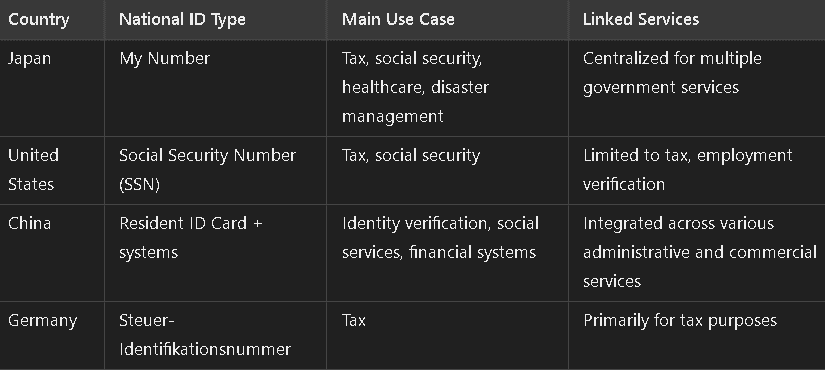
行政手続における特定の個人を識別するための番号の利用等に関する法律1(マイナンバー法)
#law #Chibil #Japan #ID #国際 #日本 #AI #GPTs
The My Number Law is Japan's national identification system, introduced in 2016 to streamline government services and improve administrative efficiency. It assigns each citizen and resident a unique 12-digit number to simplify processes related to taxes, social security, and emergency responses.
1. Legal Classification of the My Number Law
Type of Law: The My Number Law falls under administrative law, regulating how the government collects, stores, and uses personal data for various administrative purposes.
Historical Context: Enacted in response to inefficiencies in public administration, particularly in managing social welfare and taxation, it was part of broader reforms aimed at improving transparency. Privacy concerns delayed its implementation, but the government assured strict data protection measures.
Implementation and Impact: Since its introduction, the My Number system has become integral to taxation, healthcare, and pensions in Japan. Foreigners residing in Japan are required to have a My Number card, which they use for accessing public services.
2. Global Comparison: National ID Systems
Japan vs. United States
Japan: My Number covers a wide range of services, including tax filings, social security, and healthcare.
United States: The Social Security Number (SSN) serves primarily for taxation and social security purposes. However, it is not integrated into a broader system like Japan’s My Number, and concerns about identity theft have risen due to the heavy reliance on SSNs.
Japan vs. China
Japan: My Number’s centralization makes it key for integrating various government services. It is mandatory for residents, including foreign nationals.
China: China’s identification system similarly integrates services, especially with its growing digital infrastructure for taxation and welfare. However, China also uses additional systems like Resident ID Cards, which have wider applications in banking, travel, and telecommunications.
3. Types of National ID Systems Globally

4. Key Differences Between Japan’s My Number and Other Systems
Privacy Concerns and Data Security
Japan: Privacy concerns led to heightened regulations on how data is stored and used, with strict penalties for misuse. This aligns Japan with other nations like Germany under the GDPR for data protection.
China: China’s use of digital infrastructure is more expansive, using ID systems not just for governance but also for surveillance and social control, raising concerns about civil liberties.
Integration with Digital Services
Japan: Digital integration continues, with My Number being linked to online banking and private sector applications. However, concerns about data security in the digital age persist.
China: China’s digital infrastructure, including services like the e-CNY and resident ID systems, is deeply interconnected with public and private sectors, reflecting the country’s move towards a more digitized economy.
5. Trends and Future Challenges
Digital Transformation: Both Japan and China are leading the way in integrating digital solutions with national ID systems. Japan’s future developments will likely involve further expansion into private sector applications, increasing concerns over data privacy.
International Trends: The adoption of national ID systems continues globally, with many countries moving toward centralization for administrative efficiency. However, public resistance, especially in democracies like the U.S., demonstrates that trust in government plays a significant role in the acceptance of such systems.
6. Advice for Foreigners Navigating the My Number System in Japan
Mandatory Registration: Foreigners must obtain a My Number to access essential services like healthcare and taxation.
Secure Your Information: Be mindful of where you share your My Number to avoid identity theft. Japan has implemented data protection laws, but users should remain cautious.
Stay Updated: As Japan integrates the My Number system with more services, staying informed about changes is crucial for navigating daily life.
7. Global Impact and Future Outlook
As more countries adopt centralized ID systems, the balance between efficiency and privacy will continue to be a global debate. Japan’s My Number system, while offering significant administrative benefits, also highlights the challenges of maintaining public trust in an increasingly digital world.
References
Guide to Payment Services in China: Discusses the Chinese identification systems and how they integrate with digital financial services. Available at gov.cn.
National Identification Systems in China and Privacy Concerns: Provides insights into China's National Financial Regulatory Administration (NFRA) and the use of national ID systems in various sectors. Available at cbirc.gov.cn.
China's National Tax Policies and Identification: Explains the role of China's tax system and the integration of identification numbers within its tax infrastructure. Available at chinatax.gov.cn.
いいなと思ったら応援しよう!

